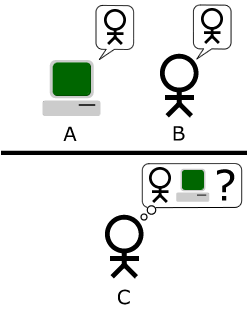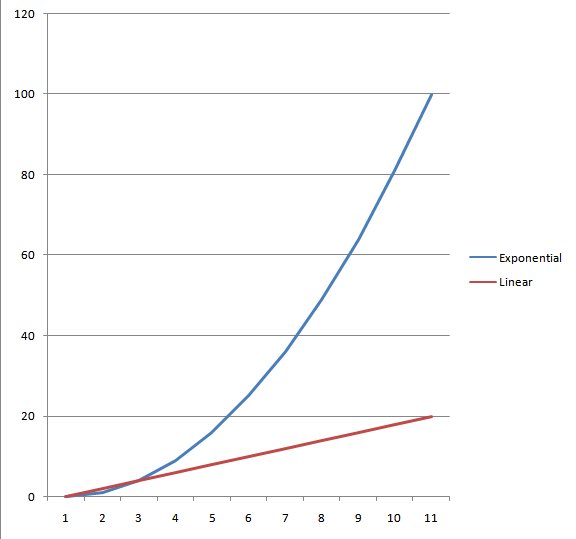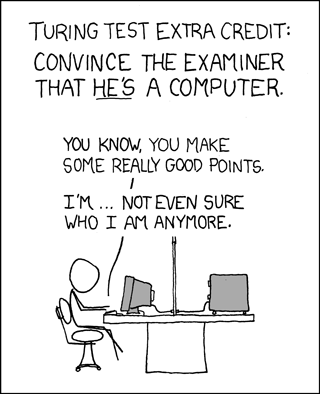What's a Turing test?
It's a simple way to test if the computer contains the (artificial) intelligence or not. However, if the computer successfully passes this test, that does not have to mean that it contains the true intelligence. Altough there had been several claims (like this one) that the Turing test is not the best way to test a computer's intelligence, Turing test remains the most popular one, primarily because there had been several references to it in a couple of well-known Hollywood movies (like Ex Machina).
Who came up with the Turing test?
As the name suggests, the Turing test was proposed by Alan Turing, a British pioneering computer scientist, mathematician, logician, cryptanalyst, philosopher, mathematical biologist, and marathon and ultra distance runner. (Yes, the guy was interested in a lot of things.)
Apart from writing a paper suggesting this test, he's also known as a guy that gave probably the biggest contribution to British intelligence in cracking the Enigma machine in Bletchley Park which had its impact on the ending of World War II.
If the name rings a bell, you might know him from the movie called The Imitation Game, where he was played by Benedict Cumberbatch.
How do you conduct a Turing test?
It's simple. Put a computer (A) and a human (B) on one side and a human tester (C) on the other side. If the tester (C) can't recognize which candidate is human and which candidate is a computer after a series of questions, then the computer successfully passed the Turing test.
Of course, the tester (C) is not allowed to see the contestants so he can't make the decision based on their physical appearance. The most common way today to separate all of the participants in the test physically is to make some sort of a chatting interface.

But what about Eugene Goostman and other chatbots? Didn't they pass the Turing test?
Chatbots are not intelligent in any way.
Although there had been numerous claims that Eugene Goostman passed the Turing test, that simply is not true. Let us just say that he cheated the test in a lot of ways (further reading).
Cleverbot's developers also claimed that he passed the Turing test a while back, but almost everyone knows that he's not really intelligent (if you don't, chat with him yourself).
In his book called The Singularity is Near (published in 2005), Ray Kurzweil predicts that there will be more and more false claims as the time goes by.
Will we succeed in creating a true AI?
Yes (well eventually). But there's still a lot of things that we first need to figure out.
Lets list a few of them here (using this as a source):
- The weakness of current computer hardware. Yup, regardless of the fact that the computer hardware is rapidly becoming stronger, we still need to improve it quite a bit for them to be able to support the real intelligence.
- The relatively minimal funding allocated to AI research. Yes, there's IBM's Watson program and yes, there's a huge support from Google recently, but it's still neglected by most of the companies.
- The difficulty of integrating multiple complex components together to make a complex dynamical software system, in cases where the behavior of the integrated system depends sensitively on every one of the components.
Some other obvious problems:
- We still haven't agreed on a set of rules regarding the AI's behavior (which obviously doesn't mean that AIs are going to comply to them).
- Human brain capacity reaches something like 2.5 petabytes (source). We still haven't found a way to store such a massive amount of data and developed algorithms capable of accessing such amount of data in (almost) real time.
- We still haven't perfected voice recognition and speech synthesis.
- We still haven't found a proper way to test the intelligence (as already stated, Turing test is not a perfect way to test this, but it remains the most popular one).
- We still haven't been able to figure out everything happening in the human brain. We can't replicate something we still don't fully understand.
So when will a computer pass the Turing test?
Some people suggest that it'll happen somewhere around 2029. Other people think that this might happen somewhere closer to 2040. Most people agree that it'll happen in our lifetime.
Of course, these are all predictions based on the current technological development process. Moore's law (doubling of the computer's power every year or two) is still considered to be true. However, there are strong indications that this law is going to die in the next decade (even Gordon Moore, its original author, agrees with this).
Scientists disagree with the speed of the growth of technological innovations. Some people think that this growth is linear, while others think that the growth is following the exponential route.
From the picture attached bellow, you can see that the difference between a linear and exponential growth is huge and it gets bigger as the time goes by. Now, use two years as a dot in the X axis and the power of the computer that you can buy for $1,000 as Y axis and you'll realize the difference between those two functions.

Should we be worried about a computer passing this test and killing us all?
No.
This claim comes from the idea that the humans are not going to continue improving themselves. However, evidences suggest otherwise. We are already lengthening the average lifespan for hundreds of years. Tests conducted in schools are getting harder and harder over time. Today's graduates know much more than graduates from a century ago. IQ scores are rising.
There's no indication that this trend is going to stop. With the technology that is going to become available in the near future, we're likely to improve our intelligence drastically. After all, once we manage to create a genuine AI, we will surely be able to improve our own intelligence shortly after.
With that being said, it seems highly unlikely that the humans will be like pets to AI beings. More likely, we will improve human intelligence alongside artificial intelligence.
Eventually, it looks like we will come to the point in time where the real world and the virutal world will become indistinguishable from each other.
Should we be careful?
Definitely. This could be our greatest invention but it could also be our last one.
Aren't you a bit biased?
Of course I am. Everyone is. After all, AI is still nothing more than our imagination, although we're getting closer to accomplishing it.
I'm constantly exploring the theories of artificial intelligence and adding new information to this website. I will change some of my opinions on this topic as soon as I learn something new. Because of this, you should not consider this resource as one final answer to this question.
You know what? Screw you! I want to create MY OWN opinion!
You're more than welcome to. Here's a couple of links that should get you started:
- Computing Machinery and Intelligence by Alan M. Turing, the original paper covering the idea of the Turing test (.pdf version)
- An interactive Flash presentation explaining the Turing test
- Response to announcement of chatbot Eugene Goostman passing the Turing test by Ray Kurzweil
- The Singularity Is Near: When Humans Transcend Biology, a book by Ray Kurzweil (there's also a documentary available)
So what's the point of this website?
This website provides simple plain English explanation to the age old question: Has the Turing test been passed?
Its point is to debunk this myth in the simplest way possible.
Who's the owner of this? I want to complain!
Does it really matter?
The code behind this site is hosted on GitHub. If you want to complain, suggest some new source or something else, create an issue there.
If you really want to know, my name is Aleksandar Todorović. I'm active on Twitter and GitHub. I'm a Community Moderator at Opensource.com and I had some (minor) contributions to open source projects like reddit, Tor Project and elementary OS.
